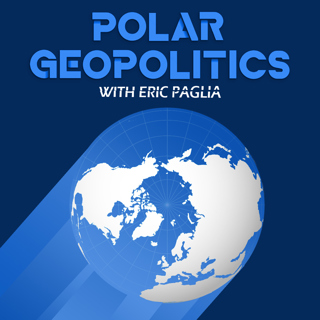
Data cable crossroad or circumpolar chokepoint: The geopolitics of subsea infrastructure in the Arctic
The deployment of subsea data cables across different marine areas of the circumpolar North has become a significant development in discussions of Arctic geopolitics. Meanwhile security concerns over subsea infrastructure have become heightened by recent incidents involving the disruption and destruction of energy pipelines and telecommunication cables in the Baltic Sea. Nima Khorrami, a research associate at the Arctic Institute, joins the podcast to explain why data cables are crucial for the economic development of the Arctic, and how the expansion of subsea infrastructure entails the need for an enhanced security presence in the region, perhaps on the part of NATO. The episode also includes a discussion on the recent announcement that Dubai-based DP World will partner with Russia in developing the Northern Sea Route, and whether this signals a new interest in the Arctic among middle eastern countries such as the United Arab Emirates.
10 Nov 202348min

Russia, security and the effects of NATO enlargement in the Arctic
The security situation in the Arctic has changed significantly since Russia’s invasion of Ukraine, although the military buildup in the region began well before 2022. Katarzyna Zysk, professor of International Relations and Contemporary History at the Norwegian Institute for Defence Studies, joins the podcast to discuss Russia’s military posture in the Arctic, the effects of NATO enlargement, and the overall geopolitical situation in the region, including the role of China and Russia’s efforts to reach out to other non-Arctic states. Prof. Zysk also explains how various technologies, such as drones and artificial intelligence, will shape the Arctic security environment in the years ahead.
6 Okt 202355min

Nuclear risks from Kakhovka Dam destruction and enduring issues surrounding Soviet-era energy infrastructure
The recently destroyed Kakhovka Dam and the nearby Zaporizhzhia Nuclear Power Station are inextricably linked legacies of Soviet energy infrastructure that have become major concerns in the midst of the war in Ukraine. Achim Klüppelberg from the Nuclear Waters project at KTH Royal Institute of Technology is an expert on nuclear energy in Ukraine and Russia, and he joins the podcast to provide an in-depth analysis of the dire situation in the lower-Dnieper region. He also explains the enduring risks and complexities surrounding nuclear energy and infrastructure in the post-Soviet space, including Chernobyl, and discusses an array of nuclear issues related to the Russian Arctic.
16 Jun 20231h 17min

Alaska: Energy, security and political economy in the American Arctic
The United States is an Arctic country on account of Alaska, which has for almost 50 years been a major domestic source of oil and natural gas, facilitated by the extensive Trans-Alaska Pipeline System. Alaska has thus been critical for US energy security, as well as national defense due to its close proximity to Russia. However, despite popular perceptions and controversial projects such as Willow, the dominance of the oil industry in Alaska has declined in recent years. Dr. Philip Wight, assistant professor at the University of Alaska at Fairbanks and an expert on Alaska’s energy infrastructure, joins the podcast to discuss an array of issues related to Alaska and the Arctic, including the changing role of oil in the state’s political economy, environmental concerns connected to the extraction of energy and mineral resources, the importance of the massive military presence in the state, and the enduring tensions between Alaska and the US federal government. He also provides a comparison between Alaska and other sub-regions in the circumpolar North.
22 Mai 20231h 8min

World stages: Arctic megaconferences as platforms for governance and geopolitical performance
Arctic megaconferences like the annual Arctic Frontiers in Tromsø and the Arctic Circle Assembly in Reykjavik have become critical meeting places that literally provide a world stage for the performance of Arctic governance and geopolitics. They have further served a particularly important purpose in the absence of official gatherings during the Arctic Council pause of the past year. Yet how much of what takes place, in public and private, actually influences developments and decision making in the Arctic? Do elaborate PR and public diplomacy activities that characterize conferences affect perceptions of Arctic stakeholders, and are certain voices privileged over others in such contexts? Beate Steinveg, associate professor at Nord University in Norway, has for many years conducted in-depth research on Arctic conferences. She joins the podcast to share her insights into the multifaceted importance of such events in shaping the governance of the region. Please consider supporting the Polar Geopolitics podcast through PayPal or Patreon Please rate and review Polar Geopolitics wherever you get your podcasts. You can follow Polar Geopolitics on Twitter @polargeopol. Website: http://www.polargeopolitics.com/
15 Feb 202334min

Insights on Antarctic governance and geopolitics with former CCAMLR chair Jakob Granit
Despite the Covid crisis and Russia’s invasion of Ukraine, the Commission for the Conservation of Antarctic Marine Living Resources took certain steps forward on the management of key Southern Ocean fisheries during the recent Swedish CCAMLR chairmanship, which concluded in November at the organization’s annual meeting in Hobart. The creation of new Marine Protected Areas and other environmental protection measures have, however, continued to be blocked by some member states. Dr. Jakob Granit, Director General Swedish Agency for Marine and Water Management, joins the podcast to share his experiences and insights from two years as CCAMLR chair on managing the Antarctic marine environment, engaging with Russia inside the Antarctic Treaty System, and navigating the increasingly complex geopolitical dynamics of Antarctic governance. Please consider supporting the Polar Geopolitics podcast through PayPal or Patreon
15 Des 202244min

Inside the Arctic Council pause with Finland’s Arctic Ambassador Petteri Vuorimäki
Although the Arctic Council has remained on pause since Russia’s invasion of Ukraine, multilateral interactions and diplomatic activity among senior Arctic officials (excluding representatives of Russia) has by no means come to a complete stop. Meanwhile, some stakeholders, particularly the Permanent Participant indigenous peoples’ organizations in the Arctic Council, see the current pause, even if well justified, as a relative loss of influence over Arctic governance. Finland’s SAO and Ambassador for Arctic Affairs Petteri Vuorimäki joins the podcast to provide insight into the current situation surrounding the Arctic Council, and to discuss Finland’s Arctic agenda as well as Arctic-Baltic security following Finland and Sweden’s NATO applications.
25 Nov 202224min

Looking North for Renewables: Arctic solutions to Europe’s green transition
With energy and strategic raw materials increasingly at the center of geopolitics, the European Union’s first Arctic ambassador argues that Europe should look to certain areas of the Arctic in implementing its Green New Deal and transition towards renewables. Ambassador Marie-Anne Coninsx, senior associate fellow at the Egmont Institute in Brussels, joins the podcast to discuss a new Egmont report she co-authored with Karen van Loon, “Europe’s Energy and Resource Challenge: The Arctic is Part of the Solution”. She also makes the case for Belgium’s Arctic stakeholder status, while elaborating the country’s long-term engagement in the region.
2 Nov 202229min





















